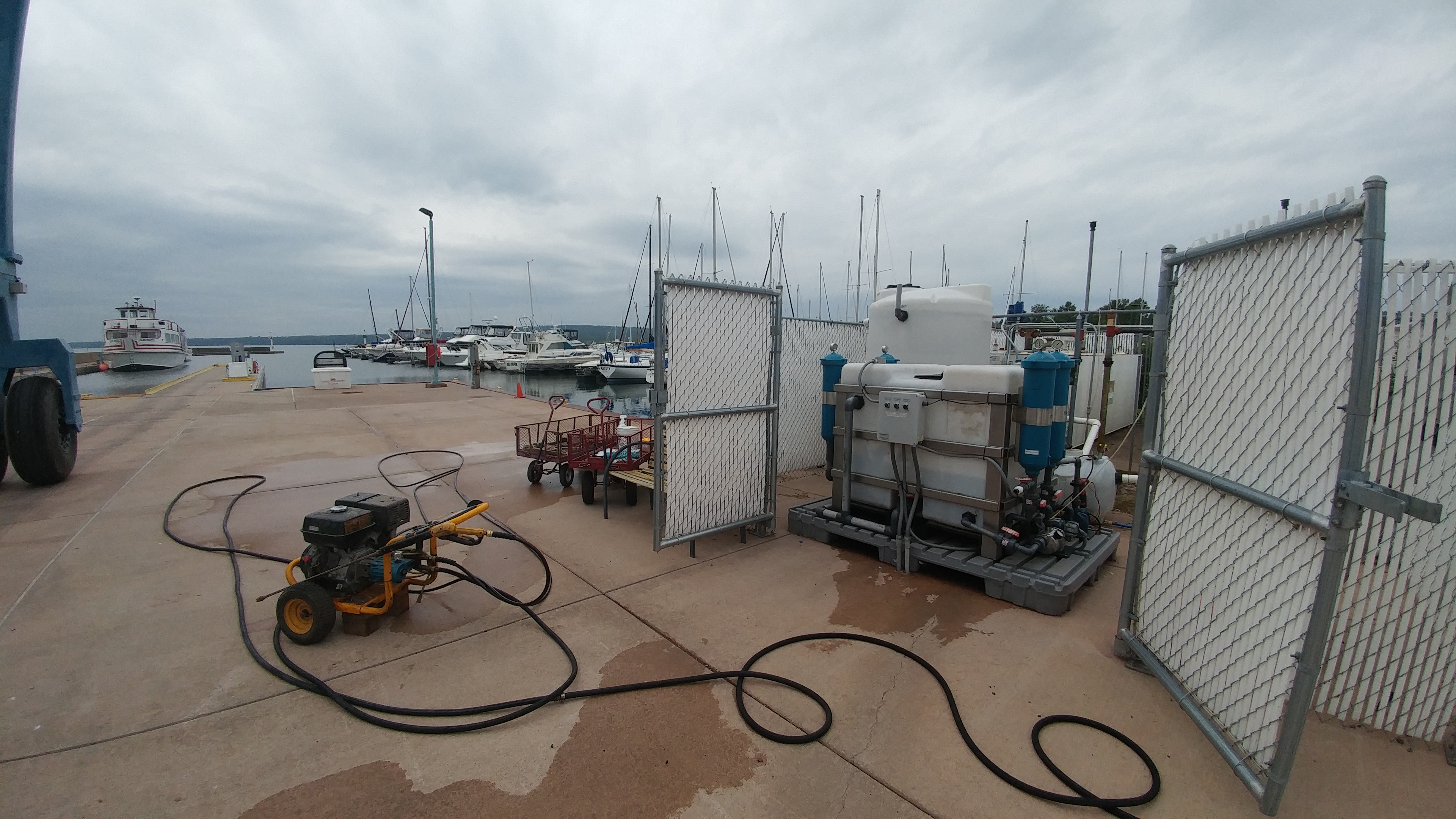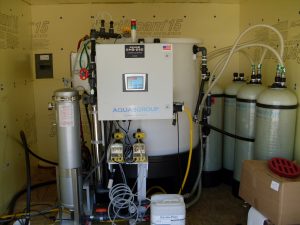
Midwest Marinas Ready for Pressure Wash Water Regulation Enforcement
Published on August 30, 2018For many years, coastal marinas and boatyards have grappled with regulations, rules, best management practices and guidance on how to treat their pressure wash wastewater to prevent it from running into the water and running afoul of the Clean Water Act. Copper bottom paint, stormwater, swales, retention basins and more are terms of familiarity.
The debates and decisions by coastal states on what to require, and by the marine industry on what’s feasible and reasonable, has long be ongoing. Typically, coastal states have adopted regulations faster and faced stricter regulations quicker than inland states, but more and more inland states are now enforcing those rules. Marinas along lakes and rivers are required to have stormwater management plans and, to varying degrees, some sort of treatment or capture of waste waters coming from pressure wash operation.
Marinas in inland states have taken varying approaches to compliance.
In Minnesota, regulations require marinas to first determine if wash water and the wastes associated with it are hazardous, and if so, manage the waste under the state’s hazardous waste rules. Management options include discharging wash water directly to the sanitary sewer, collecting the pressure wash water and temporarily storing it in a holding tank, or discharging non-hazardous pressure wash water to a river, lake or estuary, under the requirements of the National Pollutant Discharge Elimination System (NPDES) and/or State Disposal System (SDS) permit from the Minnesota Pollution Control Agency (MPCA). Discharged waters have to be treated and free of contaminants.
Rick Chapman, general manager of Sunnyside Marina in Minnesota, first became aware of the regulations guiding pressure wash waste water in 2005, but at that time there was no impact on Midwest marinas. However, he knew that just because regulators weren’t conducting inspections didn’t mean his marina shouldn’t address the issue.
Ahead of the Game
After watching the water, turned blue from paint debris, run off his wash pad and travel into one area of his facility, he knew he needed to act. Chapman visited vendors during a conference and found the recycling system he wanted. He learned that by recycling, he wouldn’t need to consider additional discharge and disposal permits and requirements, and there was a bonus of reducing the need for city water. But before he could purchase it and move forward, he had to get his slip owners to agree to the expense. Sunnyside is a marina where members own their slips and decisions are guided by a board of directors.
“First, I had to get the board on-board to recommend the equipment to slip owners. Next, I held two town hall meetings to present the case for why this was needed and what I wanted to do, and that Sunnyside should be ahead of the curve instead of waiting for regulators to come. Membership voted their approval overwhelmingly,” Chapman said.
Chapman purchased a recycling system or Zero Liquid Discharge System from Aquas Group based in Rhode Island. The system recycles wash water for re-purified reuse.
“I installed the system in 2011, and it’s been flawless. They came out after five years to go through everything just as a check-up. I winterize it, and otherwise just change filters. Sometimes I’m changing filters in the morning, lunch and later afternoon if we’re having a busy haul-out day. I like to change out the

filters while my guys are on a break so they never have to worry about it.” He said the filters are ordered through the company at minimal cost.
The actual system in place at Sunnyside was a $35,000 expense, but the overall project cost more than $350,000, because the marina had to divert stormwater. “Stuff comes rolling down the hill through stormwater from highways and a condo, and it all rolls over my washpad. When we are the busiest hauling boats, it’s always raining and I couldn’t have kept up with the rain, stormwater flow and pressure wash water running over the pad. The first step had to be diverting that stormwater and making it do something else,” Chapman said.
The water was given a new path that now runs through a trench, into drains, then a pipe and finally into the river. There is no filtering or treatment required for this stormwater.
Sunnyside has a haul-out season that runs from about mid-September until the end of October. During that time, they haul and wash about 40 boats per week ranging in size from 25 to 70 feet. Two power washers work over the washdown pad that sits right next to the travel lift well. Chapman estimates the marina uses approximately 40 to 50 gallons of water per boat, water that now is all recycled instead of coming from the city lines.
Chapman acknowledges his system is a bit above and beyond what is required. As the minimum to meet the permit BMPs, the Minnesota Clean Marina program suggests filtration around washdown pads, similar to the sock filled structures found at construction sites.
State BMP Guidance
Victoria Harris, Wisconsin Clean Marina program coordinator said, “Wisconsin does not have very strict requirements compared with other states. Marinas can download a general wash water disposal permit online and are supposed to voluntarily abide by the practices allowed in the permit.”
She said the Clean Marina program tells marinas to follow the guidelines and Best Management Practices (BMPs) set forth in the permit. The preferred BMP is to direct wash water to an area where solids will be trapped by soil and the remaining water will seep to the groundwater. Where this isn’t an option, facilities should remove solids from the wash water before it is discharged to surface water by holding the water and allowing the solids to settle out or filtering the solids before discharge. The means to accomplish this is left up to the facility, knowing that regulators may at some point test the surface waters for contaminants to determine if a facility is in compliance with the permit.
Overall, the direction and solutions of this permit are fairly vague, Harris said, which allows marinas to be creative in treatment, but also increases the likelihood that a surprise compliance visit will not reveal clean water.
“Most of our certified Clean Marinas either use hay bales to filter wash water, as it drains back to lakes or have connected their wash stations to a sanitary sewer. This is one of the regulations that often stands in the way of marinas becoming certified. Most can’t afford active treatment systems or sewer hookup. We are applying for a grant this fall that may provide us with some funds to cost-share wash water treatment systems or sewer connections with Lake Michigan marinas,” Harris said.
Michelle Shrider, general manager at Washburn Marina in Wisconsin and president of the Wisconsin Marina Association (WMA) had a recycling system installed at her facility in 2011. “We didn’t have direct runoff at Washburn because we had a gravel area between wash and water. Waste was being remediated through the gravel, but this had been done for so long that it was hard to tell if you were standing on gravel or old paint,” Shrider said. The marina removed gravel and installed cement, so workers didn’t have to stand in muddy gravel and water during hauls and washes.
Redoing the washdown pad provided the perfect opportunity to address the runoff as part of a larger project. Because Washburn is a municipality, it was able to take advantage of grant funding, as well as money from the City of Washburn Harbor Commission. In Wisconsin, all municipalities are required to have a harbor commission to oversee activity on federal bodies of water. The commission works as a semi-autonomous group within the city with its own budget. The commission provided the match to the grant funding that the project received. Washburn Marina has used money from the Wisconsin Department of Natural Resources Waterway Funding and the U.S. Fish and Wildlife Services Boating Foundation. Shrider realizes how fortunate the marina is to have these resources since private marinas generally do not have such opportunities.
Shrider chose an EMP AquaClean system, where the water flows from the pressure wash pad into a trench and then is funneled into a multichambered filtering system that removes all contaminants so the water can be reused for more pressure washing. The marina hauls from eight to 10 boats per day from mid-September through the end of October. The boats range in size from 25 feet to 100 feet.
The maintenance for the system is minimal. The four filtering systems require filter changing about once a week. Two of the filters are re-usable, while the other two require new installations each time. The cost is about $40 a filter, and Shrider estimates she spends less than $1,000 a year for the filters and occasional parts. Because Wisconsin essentially closes the boating season in the winter, Shrider also disassembles the entire system and shrinkwraps it to protect it during the off-season.
Cheaper Options
As president of WMA, Shrider also wears the hat of encouraging other marinas to comply with the rules and do what they can to prevent contaminated runoff from entering the waterways. WMA supports Clean Marina, and works with the pledged marinas.
“To expect a marina to layout that kind of cash (like we did) for a system is unreasonable,” Shrider said. Facilities use alternatives, such as haybales, where water runs off and the hay catches particulate, sand filled sacks like those used to prevent floodwater, or a containment basin, where debris settles and is cleaned out on a regular basis.
“There are quite a few options, and we encourage marinas to be as effective as they can, given constraints of the budget,” Shrider said.
Midwest marinas may have escaped site visits and fines in the past, but both Chapman and Shrider anticipate at some time the issue of wash water treatment will come to the forefront, and marinas will have to be ready to take some action.
| Categories | |
| Tags |






